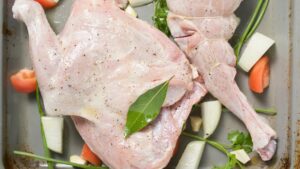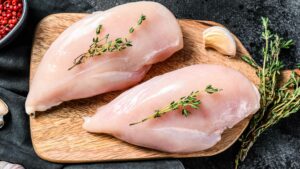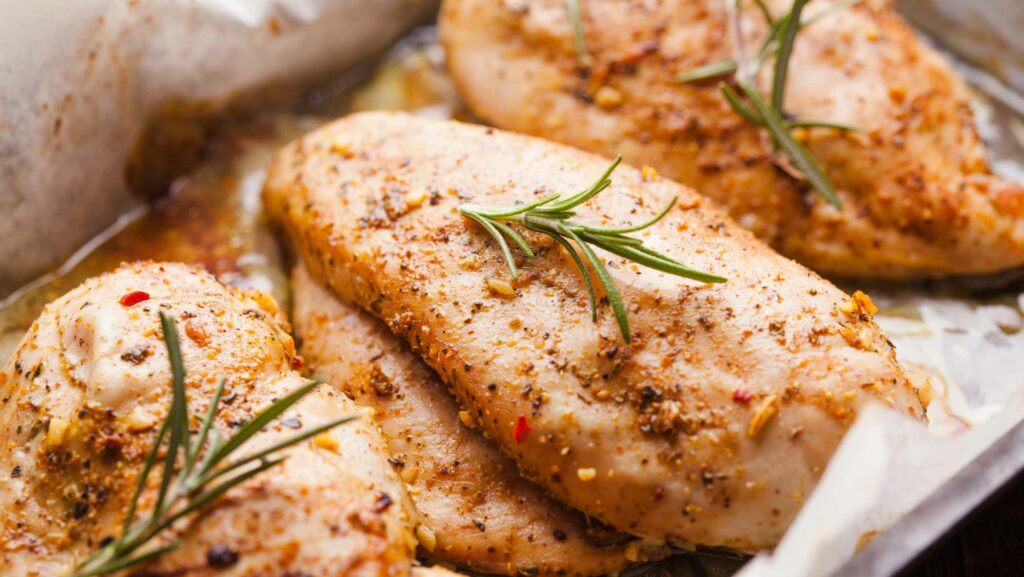When it comes to enhancing the flavor of poultry dishes, there’s no denying the power of herbs. They’re the secret weapon in every chef’s arsenal, transforming ordinary meals into extraordinary culinary experiences. This article will delve into the world of poultry herbs, offering a fresh perspective on their uses and benefits.
From rosemary’s piney essence to the subtle sweetness of tarragon, each herb adds a unique twist to poultry dishes. But it’s not just about taste. These green powerhouses pack a nutritional punch too, offering a myriad of health benefits. So, let’s embark on a journey to discover the magic of poultry herbs, their culinary potential, and their health-boosting properties.
Poultry Herbs
 The value of herbs goes beyond flavoring in poultry dishes. When incorporated into poultry diets, these herbs offer a range of health benefits.
The value of herbs goes beyond flavoring in poultry dishes. When incorporated into poultry diets, these herbs offer a range of health benefits.
Herbs function as a natural way of strengthening the immune system of poultry. For example, garlic assists in combating numerous diseases due to its antifungal, antibacterial, and antiviral properties. Thyme, another powerful herb, contains thymol, a compound known to enhance overall immunity in poultry. By bolstering the immune system, these herbs help poultry fend off a variety of diseases, ensuring optimal health and longevity.
In addition to immune support, herbs can stimulate growth and productivity in poultry. Take oregano, for instance, which is high in vitamins A and C, and helps promote faster growth rates and heavier weights in poultry. Similarly, ginger improves digestion and absorption of nutrients, contributing to increased productivity. Hence, herbs not only boost poultry’s health but also augment their growth and performance.
Popular Herbs Used in Poultry Feeding
 With its robust flavor and notable health benefits, oregano ranks as one of the popular herbs used in poultry feeding. It hosts a rich composition of phenolic acids and flavonoids, this meaning it possesses strong antioxidant qualities. From a poultry perspective, it’s compelling how oregano manifests antibiotic properties. A study by the British Poultry Science indicated that oregano essential oil improved growth performance and the intestinal microbiota of chickens, signifying its function as a natural antibiotic.
With its robust flavor and notable health benefits, oregano ranks as one of the popular herbs used in poultry feeding. It hosts a rich composition of phenolic acids and flavonoids, this meaning it possesses strong antioxidant qualities. From a poultry perspective, it’s compelling how oregano manifests antibiotic properties. A study by the British Poultry Science indicated that oregano essential oil improved growth performance and the intestinal microbiota of chickens, signifying its function as a natural antibiotic.
Thyme, a modest yet powerful herb, remains favored in poultry feeding for health-specific reasons. Thymol, one of thyme’s primary compounds, holds potent antimicrobial and anti-inflammatory benefits. More specifically, it supports respiratory health in birds, as noted by the Poultry Science Association. Its role in minimizing respiratory diseases makes thyme an integral addition to poultry diets.Techniques for Integrating Herbs into Poultry Diets
The inclusion of beneficial herbs in poultry diets focuses primarily on improving health and performance. Effectively leveraging these potent plants, however, depends on correct integration techniques. The following explore various strategies and considerations for incorporating herbs into poultry diets.
Fresh vs. Dried Herbs
The choice between fresh and dried herbs relates to convenience, budget, and availability. Opting for fresh herbs represents a premium, offering higher moisture content and potentially more fragrant aromatics. Nevertheless, accessibility and preservation present challenges. On the contrary, dried herbs offer an economical, easy-to-store option, with a more extended shelf life and less intense flavor than their fresh counterparts.
The Science Behind Herbs in Poultry Health
 The focus shifts now to the underlying science that justifies the strategic use of herbs in poultry health. Diving into the intricacies of herb utilization, we’ll uncover its validation through research findings and real-world success stories.
The focus shifts now to the underlying science that justifies the strategic use of herbs in poultry health. Diving into the intricacies of herb utilization, we’ll uncover its validation through research findings and real-world success stories.
Advancements in scientific studies yield compelling results, linking herbs to poultry health. For example, the Poultry Science Journal published an investigation in 2018 featuring oregano essential oil. After consistent ingestion, chickens demonstrated improved weight gain, a sign of ramps up productivity. Besides, the research also registered a notable decline in Salmonella, illustrating oregano’s antibacterial effect.
Furthermore, findings from the Journal of Animal Physiology and Animal Nutrition reveal thyme’s prowess in enhancing respiratory health. The 2017 study elaborates on how thyme essential oil reduces the incidence of respiratory diseases in broilers. Simultaneously, it shows that the herb regulates immune responses, therefore escalating overall fortitude.

